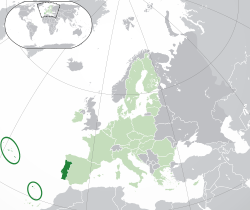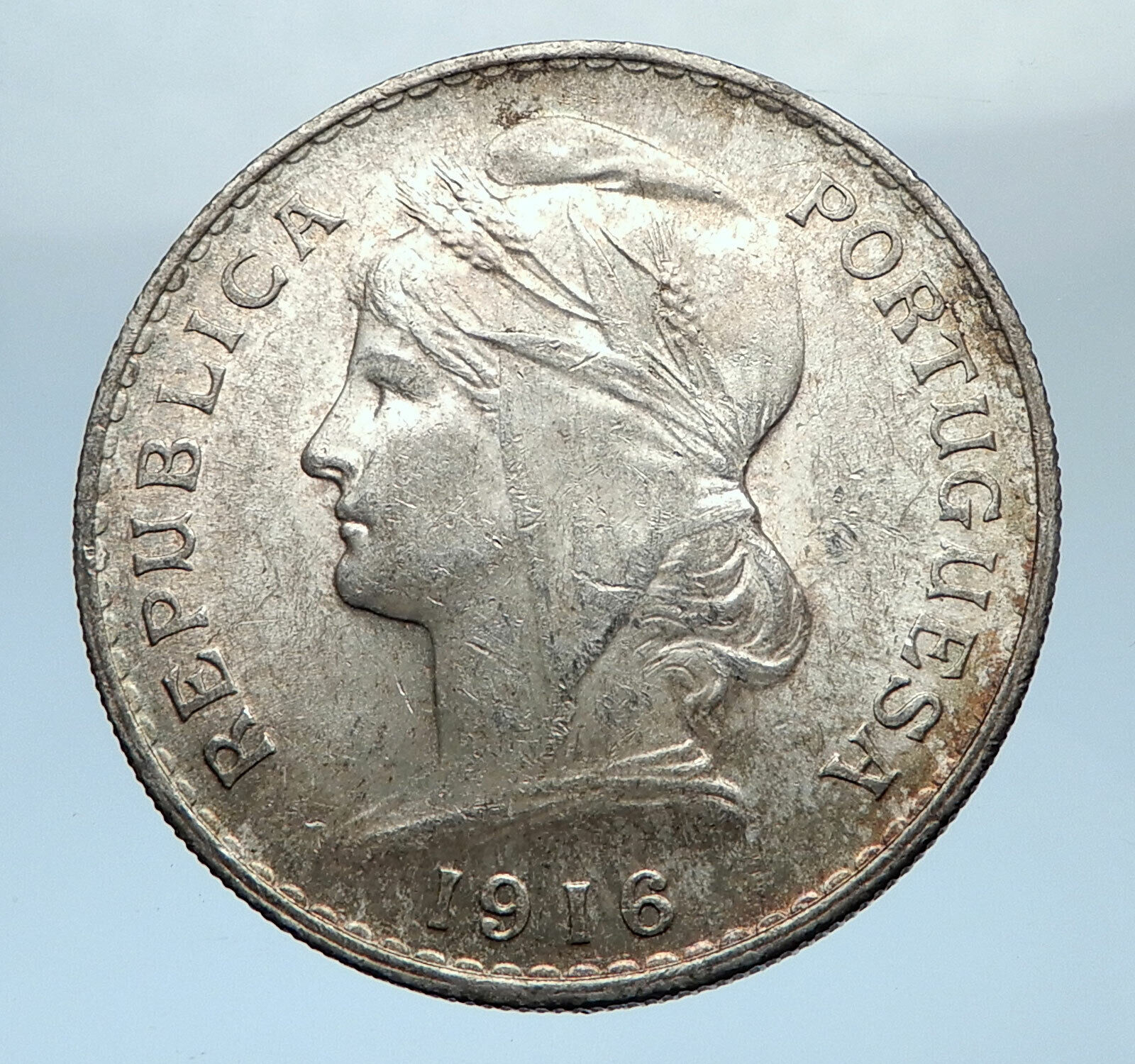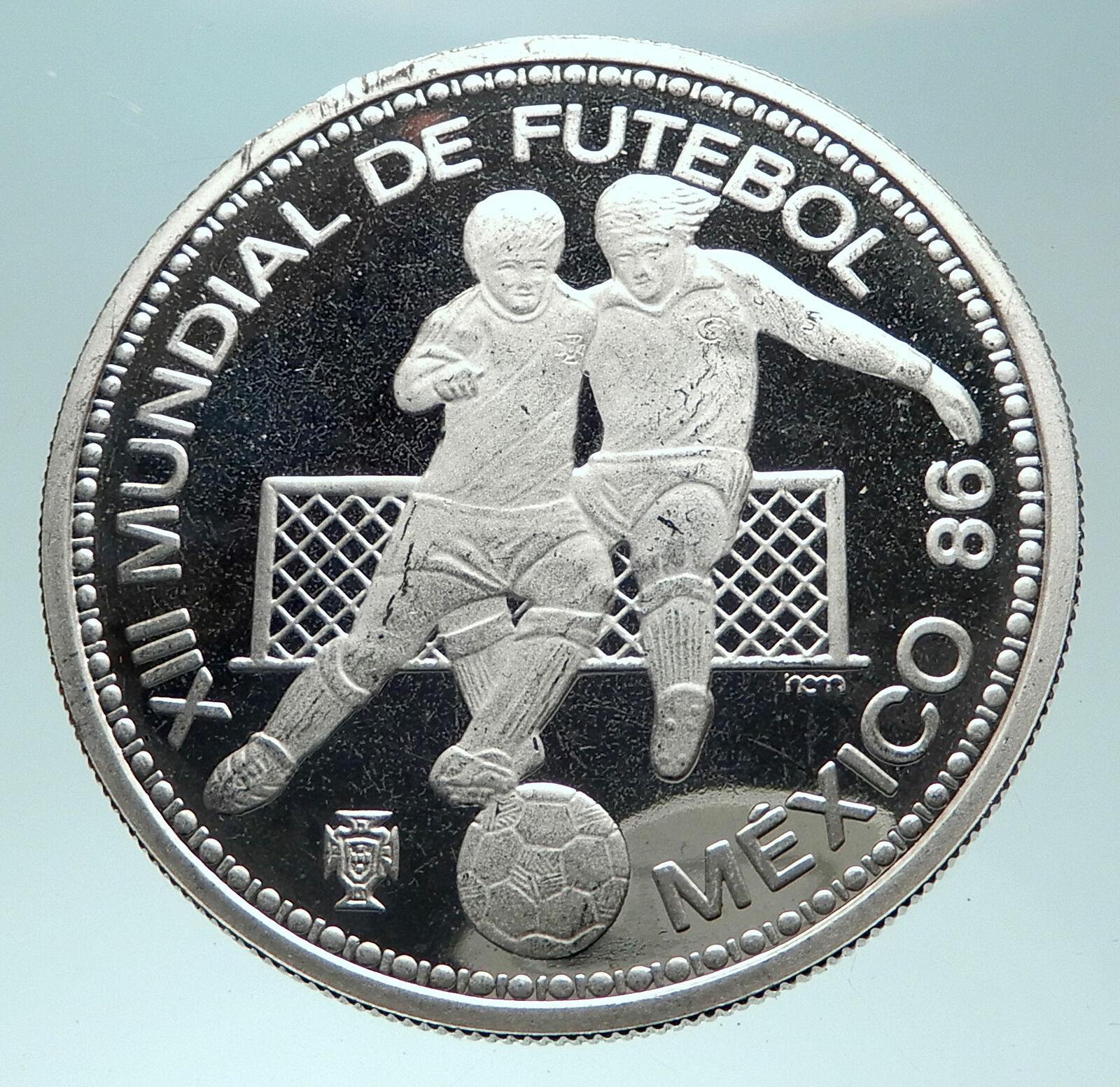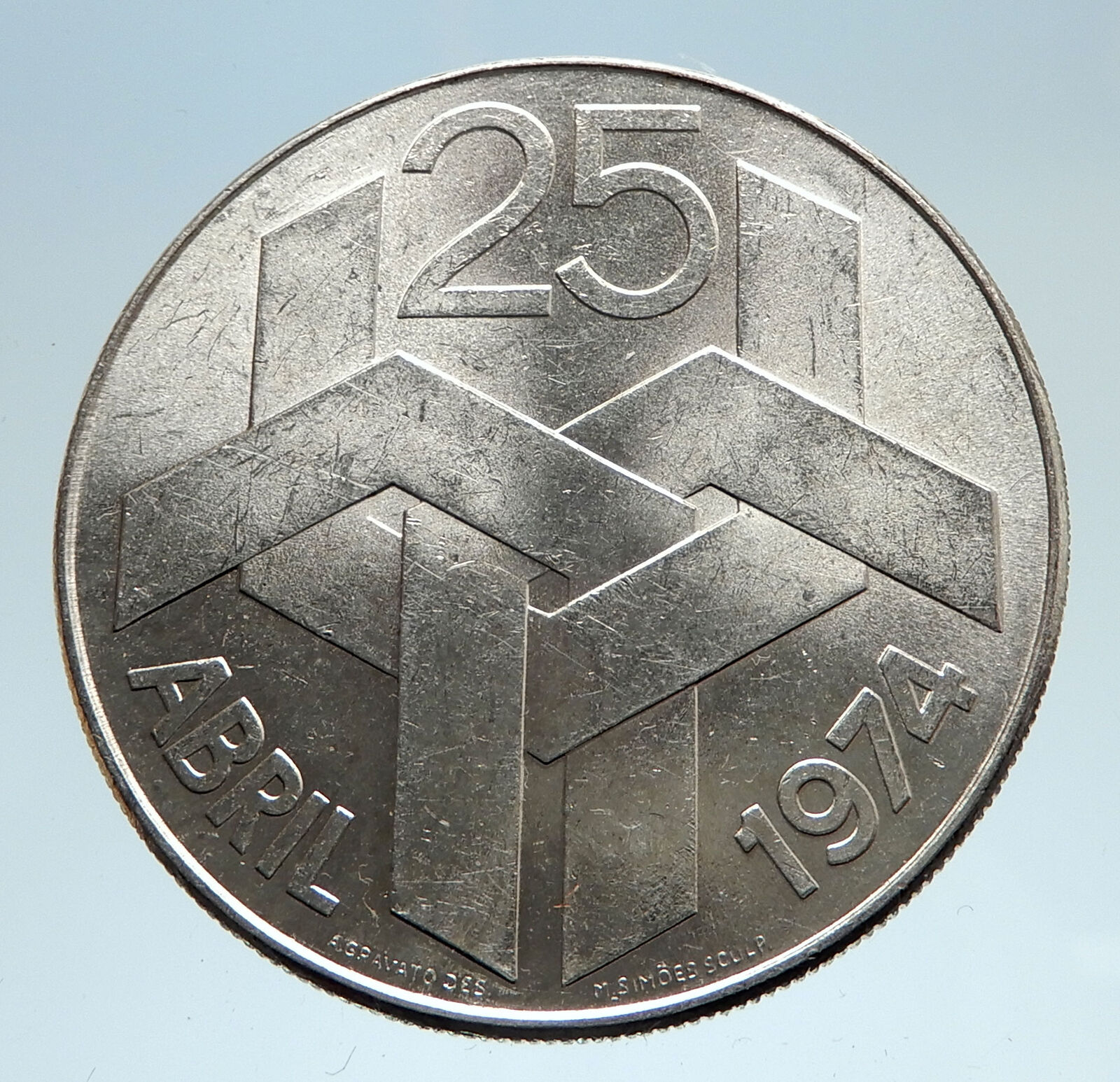|
Portugal – 2004 UEFA Euro, Portugal
2001 BU Silver 1000 Escudos 40mm (26.95 grams) 0.500 Silver (0.4332 oz. ASW)
Reference: KM# 734, Gomes# R 172.01 | Engraver: José Simão
REPUBLICA PORTUGUESA · 2001 1000 ESCUDOS, National Coat-of-Arms of Portugal.
10° Campeonato Europeu de Futebol · UEFA Euro 2004™ Portugal José Simão – INCM, Soccer Ball in front of net.
You are bidding on the exact item pictured, provided with a Certificate of Authenticity and Lifetime Guarantee of Authenticity.
 The 2004 UEFA European Football Championship, commonly referred to as Euro 2004, was the 12th edition of the UEFA European Championship, a quadrennial football competition contested by the men’s national teams of UEFA member associations. The final tournament was hosted for the first time in Portugal, from 12 June to 4 July 2004. A total of 31 matches were played in ten venues across eight cities – Aveiro, Braga, Coimbra, Guimarães, Faro/Loulé, Leiria, Lisbon, and Porto. The 2004 UEFA European Football Championship, commonly referred to as Euro 2004, was the 12th edition of the UEFA European Championship, a quadrennial football competition contested by the men’s national teams of UEFA member associations. The final tournament was hosted for the first time in Portugal, from 12 June to 4 July 2004. A total of 31 matches were played in ten venues across eight cities – Aveiro, Braga, Coimbra, Guimarães, Faro/Loulé, Leiria, Lisbon, and Porto.
As in 1996 and 2000, the final tournament was contested by 16 teams: the hosts plus the 15 teams that came through the qualifying tournament, which began in September 2002. Latvia secured their first participation in a major tournament after overcoming Turkey in the play-offs, while Greece returned to the European Championship after 24 years.
The tournament was rich in surprises and upsets: Germany, Spain, and Italy were eliminated in the group stage, while defending champions France were knocked out in the quarter-finals by Greece. Portugal recovered from an opening defeat against Greece to reach the final, eliminating England and the Netherlands along the way. For the first time in a major European football tournament, the last match featured the same teams as the opening match. Portugal were again defeated by Greece with a goal from Angelos Charisteas. Greece’s triumph was unexpected, considering that they had only qualified for two other major tournaments, the UEFA Euro 1980 and the 1994 FIFA World Cup, where they failed to win a single match. As winners, Greece earned the right to represent Europe at the 2005 FIFA Confederations Cup.
During the opening ceremony, one of the tableaux depicted a ship – symbolising the voyages of the Portuguese explorers – sailing through a sea that transformed into the flags of all competing countries. In the closing ceremony, Portuguese-Canadian singer Nelly Furtado performed her single and official tournament theme song, “Força”.
  Portugal, officially the Portuguese Republic (Portuguese: República Portuguesa), is a country on the Iberian Peninsula, in Southwestern Europe. It is the westernmost country of mainland Europe, being bordered by the Atlantic Ocean to the west and south and by Spain to the north and east. The Portugal-Spain border is 1,214 km (754 mi) long and considered the longest uninterrupted border within the European Union. The republic also includes the Atlantic archipelagos of the Azores and Madeira, both autonomous regions with their own regional governments. Portugal, officially the Portuguese Republic (Portuguese: República Portuguesa), is a country on the Iberian Peninsula, in Southwestern Europe. It is the westernmost country of mainland Europe, being bordered by the Atlantic Ocean to the west and south and by Spain to the north and east. The Portugal-Spain border is 1,214 km (754 mi) long and considered the longest uninterrupted border within the European Union. The republic also includes the Atlantic archipelagos of the Azores and Madeira, both autonomous regions with their own regional governments.
 The territory of modern Portugal has been continuously settled, invaded and fought over since prehistoric times. The Pre-Celts, Celts, Phoenicians, Carthaginians and the Romans were followed by the invasions of the Visigothic and the Suebi Germanic peoples, who were themselves later invaded by the Moors. These Muslim peoples were eventually expelled during the Christian Reconquista. Portuguese nationality can be traced back to the creation of the First County of Portugal, in 868. In 1139, Afonso Henriques was proclaimed King of Portugal, thus firmly establishing Portuguese independence, under the Portuguese House of Burgundy. The territory of modern Portugal has been continuously settled, invaded and fought over since prehistoric times. The Pre-Celts, Celts, Phoenicians, Carthaginians and the Romans were followed by the invasions of the Visigothic and the Suebi Germanic peoples, who were themselves later invaded by the Moors. These Muslim peoples were eventually expelled during the Christian Reconquista. Portuguese nationality can be traced back to the creation of the First County of Portugal, in 868. In 1139, Afonso Henriques was proclaimed King of Portugal, thus firmly establishing Portuguese independence, under the Portuguese House of Burgundy.
In the 15th and 16th centuries, under the House of Aviz, which took power following the 1383-85 Crisis, Portugal expanded Western influence and established the first global empire, becoming one of the world’s major economic, political and military powers. During this time, Portuguese explorers pioneered maritime exploration in the Age of Discovery, notably under royal patronage of Prince Henry the Navigator and King João II, with such notable discoveries as Vasco da Gama’s sea route to India (1497-98), Pedro Álvares Cabral’s discovery of Brazil (1500), and Bartolomeu Dias’s reaching of the Cape of Good Hope. Portugal monopolized the spice trade during this time, under royal command of the Casa da Índia, and the Portuguese Empire expanded with military campaigns led in Asia, notably under Afonso de Albuquerque, who was known as the “Caesar of the East”.
The destruction of Lisbon in a 1755 earthquake, the country’s occupation during the Napoleonic Wars, the independence of Brazil (1822), and the Liberal Wars (1828-1834), all left Portugal crippled from war and diminished in its world power. After the 1910 revolution deposed the monarchy, the democratic but unstable Portuguese First Republic was established, later being superseded by the “Estado Novo” right-wing authoritarian regime. Democracy was restored after the Portuguese Colonial War and the Carnation Revolution in 1974. Shortly after, independence was granted to all its colonies and East Timor, with the exception of Macau, which was handed over to China in 1999. This marked the end of the longest-lived European colonial empire, leaving a profound cultural and architectural influence across the globe and a legacy of over 250 million Portuguese speakers today.
Portugal is a developed country with a high-income advanced economy and high living standards. It is the 5th most peaceful country in the world, maintaining a unitary semi-presidential republican form of government. It has the 18th highest Social Progress in the world, putting it ahead of other Western European countries like France, Spain and Italy. It is a member of numerous international organizations, including the United Nations, the European Union, the eurozone, OECD, NATO and the Community of Portuguese Language Countries. Portugal is also known for having decriminalized the usage of all common drugs in 2001, the first country in the world to do so. However, the sale and distribution of these drugs is still illegal in Portugal.
|





 The 2004 UEFA European Football Championship, commonly referred to as Euro 2004, was the 12th edition of the UEFA European Championship, a quadrennial football competition contested by the men’s national teams of UEFA member associations. The final tournament was hosted for the first time in Portugal, from 12 June to 4 July 2004. A total of 31 matches were played in ten venues across eight cities – Aveiro, Braga, Coimbra, Guimarães, Faro/Loulé, Leiria, Lisbon, and Porto.
The 2004 UEFA European Football Championship, commonly referred to as Euro 2004, was the 12th edition of the UEFA European Championship, a quadrennial football competition contested by the men’s national teams of UEFA member associations. The final tournament was hosted for the first time in Portugal, from 12 June to 4 July 2004. A total of 31 matches were played in ten venues across eight cities – Aveiro, Braga, Coimbra, Guimarães, Faro/Loulé, Leiria, Lisbon, and Porto.
 Portugal, officially the Portuguese Republic (Portuguese: República Portuguesa), is a country on the Iberian Peninsula, in Southwestern Europe. It is the westernmost country of mainland Europe, being bordered by the Atlantic Ocean to the west and south and by Spain to the north and east. The Portugal-Spain border is 1,214 km (754 mi) long and considered the longest uninterrupted border within the European Union. The republic also includes the Atlantic archipelagos of the Azores and Madeira, both autonomous regions with their own regional governments.
Portugal, officially the Portuguese Republic (Portuguese: República Portuguesa), is a country on the Iberian Peninsula, in Southwestern Europe. It is the westernmost country of mainland Europe, being bordered by the Atlantic Ocean to the west and south and by Spain to the north and east. The Portugal-Spain border is 1,214 km (754 mi) long and considered the longest uninterrupted border within the European Union. The republic also includes the Atlantic archipelagos of the Azores and Madeira, both autonomous regions with their own regional governments. The territory of modern Portugal has been continuously settled, invaded and fought over since prehistoric times. The Pre-Celts, Celts, Phoenicians, Carthaginians and the Romans were followed by the invasions of the Visigothic and the Suebi Germanic peoples, who were themselves later invaded by the Moors. These Muslim peoples were eventually expelled during the Christian Reconquista. Portuguese nationality can be traced back to the creation of the First County of Portugal, in 868. In 1139, Afonso Henriques was proclaimed King of Portugal, thus firmly establishing Portuguese independence, under the Portuguese House of Burgundy.
The territory of modern Portugal has been continuously settled, invaded and fought over since prehistoric times. The Pre-Celts, Celts, Phoenicians, Carthaginians and the Romans were followed by the invasions of the Visigothic and the Suebi Germanic peoples, who were themselves later invaded by the Moors. These Muslim peoples were eventually expelled during the Christian Reconquista. Portuguese nationality can be traced back to the creation of the First County of Portugal, in 868. In 1139, Afonso Henriques was proclaimed King of Portugal, thus firmly establishing Portuguese independence, under the Portuguese House of Burgundy.




